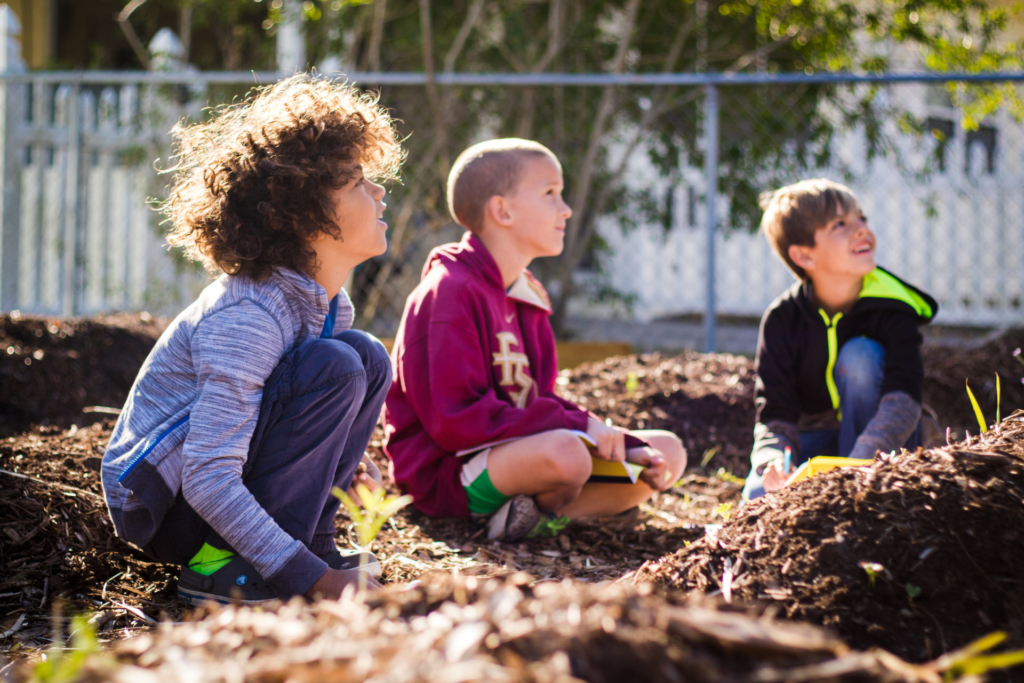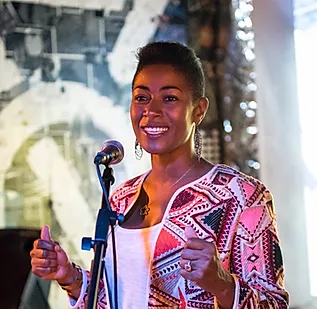Our school does not believe that standards must dictate every single educational experience. There is nothing that replaces the passion and interest of a student who’s been empowered to make a change within their community.
Ayana Verdi, Co-Founder and Executive Director, Verdi EcoSchool
Q: Can you walk us through the journey that led to the founding of Verdi EcoSchool?
Ayana: My husband and I started Verdi EcoSchool based on our experience homeschooling our son. Prior to homeschooling, he attended a highly-rated public school and then a private school. Through both experiences, we quickly learned that educational experiences produced for the masses can’t effectively enrich the individual child. We couldn’t see how our son would prize his individuality and chart his own course within a system that saw him as little more than a cog in a machine.
When our son turned five, we decided to test a different approach alongside a small cohort of other students. Our hope was to build a small community that would feel like a big, supportive family. And, we wanted to create a space for new families moving into the area, where they and EcoSchool leaders could spark a discourse on education and access to engaging experiences.
We began by collaborating with a community focused business in our local arts district to launch the area’s first community garden. This garden became a hub for our programs and offered the chance to connect to other community members who wanted to create a more engaging environment for children.
We eventually connected with 12 other families and decided—as a larger family unit—to call this experiment a school. From there, we established the not-for-profit Verdi EcoSchool as a student-centered, project- and place-based urban farm school experience built around the passions of children with guidance from parents.
In February 2017, we started our first year with 12 kids in K-8th grade. We quickly expanded to 30 kids in 2018 and 80 kids in 2019. The entire community is our campus—diverging from the thinking that learning only happens within the walls of a conventional school.
Today, we continue to stretch the definition of a “classroom.” Our young people are learning about natural ecosystems by exploring and gathering water samples at the Indian River Lagoon; they are growing food that’s made available to the broader community and educating adults about inequities in our food system; and they are building relationships with seniors at a local assisted living home. They embrace learning as both a personal experience, and as a bridge to engaging with their community.
Q: What did you learn about yourself, your son, and conventional schooling while homeschooling your son?
Ayana: With my son, I needed to learn to release some control and see him as an autonomous person who has joys, interests, challenges, and strengths. Those things would not have been revealed without allowing him to freely explore with me as a guide.
That’s a really uncomfortable dynamic for adults working in education who are trained to be the sage on the stage. They are given this identity as someone who has compiled lots of knowledge and information over the course of their life and in their position as “teacher” should regurgitate that information to a young person who is willing to sit quietly and absorb it.
The sage on the stage philosophy ignores everything we know about development and growth. And, it contradicts society’s celebration of independent thinkers who come up with innovative ideas because they didn’t wait for someone to tell them how it should be done. These independent thinkers take hold of something unique, make mistakes, and become resilient through failure.
I wanted to provide that experience for my son and five-year-old daughter. I live by a guiding principle that I want to pass on to them: If I’m not uncomfortable, then I’m not growing. I want my children to know they’re going to fail and make mistakes. That’s how they’ll learn how to do things better and continue to improve. As we shifted into homeschooling my son, I wanted to join him and experience failing forward and growing together.
My son’s willingness to jump into a space of uncertainty was inspiring. I discovered he could adapt in ways that didn’t come as easily to me. We would reach the end of a project that didn’t work out, and while I looked for a way to fix it, he would say, “Mom, sometimes things just don’t work, and that’s okay.” It’s amazing to me that a child can have that amount of resilience and willingness to embrace a growth mindset—a mindset he doesn’t even have the vocabulary to describe.
With my son, I realized so much of the conventional educational experience in our country is based around how adults feel like learning needs to happen. However, there’s a whole nation of kids saying we need to let go of the idea that everything has a fixed answer. We need to listen to that.
Q: How do conventional and non-conventional educators experience the onboarding process at Verdi EcoSchool?
Ayana: It’s difficult for educators to unlearn what they are taught through conventional training. When they pursue their degrees and the idea of serving children, they aren’t immersed in student-driven learning.
This requires EcoSchool to recruit incredibly resilient adults who are willing to fail forward and who really connect with our place- and project-based philosophy. When an educator arrives at our school, I tell them this will feel like their first year of teaching. I tell them they will feel like they’re awful at it. They will feel anxiety around developing projects and place-based exploration. But, that’s a part of the growth process.
We talk about “failing forward” a lot at our school. It takes a very special educator and specifically someone who’s truly committed to their craft. They have to be willing to say, “I love this so much. I’m willing to fail at it to do it well.” It’s usually the non-conventional educators who adapt more quickly and smoothly because they are more willing to be uncomfortable as they learn their way in a new system.
Educators from conventional paths often need more time before feeling comfortable at EcoSchool. They need time to let go of the idea of children as empty vessels. We know they’re not empty vessels. Even at a young age, they are full of interests, passions, and joy. It’s not our job to fill them with those things. It’s our job to listen to them and craft their experiences around what brings them joy.
Q: Part of that joy comes from the family-focused nature of Verdi EcoSchool. What was important to you about family that needed to be embedded in the EcoSchool learning experience?
Ayana: During the early development of EcoSchool, we decided that a conscious focus on social and emotional learning was necessary to help develop and strengthen a student’s resilience, adaptability, and ability to manage ambiguity.
That focus includes the idea of our school community as a school family. We’re more than separate individuals moving without connection in a shared space. We’re connected individuals moving together with a shared purpose and vision.
If we make the distinction that we exist as a family, we can accomplish more together and create a space where everyone, including parents and family members, feel supported. It allows students to build and develop trust within their school family. And, it also allows families to learn more about their own ideas around “failing forward” and embracing a growth mindset.
Q: What’s one story that really captures the power of this learner-centered, family-focused culture?
Ayana: In 2018, we had our first group of eighth graders—four students who were in their final year but didn’t want to leave. They came to us and said, “We’d like to figure out how we can create a high school.” For me, that meant learning about a whole new stratosphere of education that I was not prepared to explore. I initially dismissed the idea, but the students persisted, pulled in their parents, and then organized a community meeting.
The students created a presentation about why they felt we should expand into high school. The adults were convinced, and we made a presentation to our entire school family and the community about why we wanted Verdi Eco High School. We talked about why continuing into high school—with a passion-based learning approach that’s student-driven in a community that we use as our campus—was vital for current and future families.
Strangely enough, a few weeks earlier, I was introduced to The Drexel Fund—a venture philanthropy fund that invests in innovative school models nationwide. They were very interested in our school, but at the time, it seemed our priorities and theirs did not align because they were looking to invest in high schools, and we didn’t have plans to expand beyond K-8. But, then as the high school idea was introduced and support began to grow across our school family, I was able to go back to them.
And, they were quick to offer support if we were ready to take that journey of high school expansion.
So, with that, I applied as a founder, pitched the idea of extending the EcoSchool experience into high school, and was accepted as a Drexel Fund Fellow for this current school year, which meant we could officially launch our high school program. The Drexel Fund has shared financial resources, a learning plan, and mentorship that helped us create a high school that follows our unique philosophy.
Q: What is one major aspect of conventional education that Verdi EcoSchool aims to depart from?
Ayana: Our school does not believe that standards must dictate every single educational experience. There is nothing that replaces the passion and interest of a student who’s been empowered to make a change within their community. If we want them to go off into the world and be willing to fight for change, innovate ideas, be empathetic, and fail forward, how do we do that if we don’t allow them to explore their ideas? That’s one of the biggest questions that drives our work and our culture.

